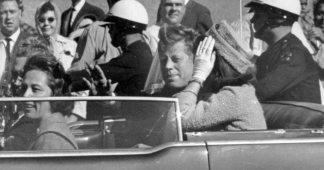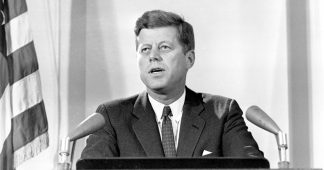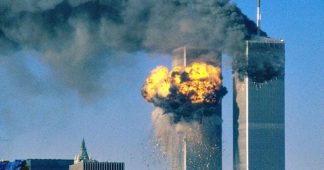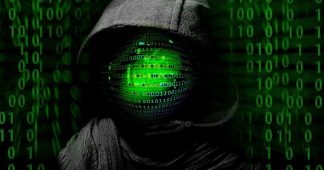By Bill Van Auken
30 October 2017
The Trump administration’s partial release of previously classified documents related to the November 22, 1963 assassination of President John F. Kennedy has been dropped by the US mass media with what can only be described as unseemly haste.
Last Thursday night, when the White House announced that it was releasing only 2,800 of the once-secret papers, withholding a significant amount of the most sensitive material in compliance with demands from the Central Intelligence Agency and the Federal Bureau of Investigation, the event was widely covered, including the publication of numerous articles in advance of the document release concerning its historic significance. A large force of reporters was deployed to stake out the National Archives.
By Sunday, it was as if the whole thing had never happened. The question was not discussed on any of the Sunday television talk shows, and neither the New York Times nor the Washington Post published so much as a word about the assassination documents in either their news or editorial pages.
From the outset, the media’s treatment of the event was characterized by a palpable nervousness. Cable news anchors and talking heads expressed their concerns that Trump’s extraordinary acknowledgment that he had “no choice” but to withhold a significant number of files because of CIA and FBI warnings over “potentially irreversible harm to our nation’s security” would only encourage “conspiracy theorists.”
This epithet, when used in relation to the Kennedy assassination, applies to roughly two-thirds of the American population, who reject the official story. Codified in the cover-up produced by the Warren Commission, this narrative insists that the murder of the 35th president of the United States was the work of a lone gunman, Lee Harvey Oswald, firing a $21 mail order rifle at Kennedy’s motorcade as it moved through Dallas’s Dealey Plaza.
This majority consensus has declined somewhat from the period of 1975 to 2001, when polls showed that over 80 percent of the population rejected the US government’s version of the Kennedy assassination.
Why would the withholding of the documents not strengthen the views of the hundreds of millions of “conspiracy theorists” who populate the United States? What plausible explanation is there for this action other than the fact that the files contain incriminating material relating to elements within the US government and its intelligence agencies?
It is not as if the documents that were released are of such scant interest as to justify the media’s collective response of “Move along folks, nothing to see here.” They expose a state apparatus steeped in bloodshed and criminality, in which assassination was an accepted means of advancing US imperialist interests.
Some of the documents concern conspiracies exposed over 40 years ago, such as the CIA’s connivance with the Mafia in plotting the assassination of Cuban leader Fidel Castro with such exotic methods as exploding seashells and a toxic wetsuit. Then there are newly exposed files that raise serious questions about a state conspiracy surrounding the assassination. These includes a document citing FBI Director J. Edgar Hoover’s frantic demand, two days after Kennedy’s death and before the investigation had even begun, for something to be “issued so that we can convince the public that Oswald is the real assassin.”
Along similar lines is a truncated file from the 1975 Rockefeller Commission’s investigation of the CIA, which records the agency’s former director Richard Helms being asked, “Is there any information involved with the assassination of President Kennedy which in any way shows that Lee Harvey Oswald was in some way a CIA agent or agent.. .” The file leaves the question uncompleted and Helms’s answer unrecorded.
Whether there exist withheld files containing the answers to such questions is unknown. No thinking person, however, can give the slightest credence to Trump’s Saturday night tweets pledging to release “ALL #JFKFiles other than the names and addresses of any mentioned person who is still living,” in order to “put any and all conspiracy theories to rest.” Trump, who during the 2016 race for the Republican presidential nomination charged that the father of his rival, Ted Cruz, was part of the conspiracy, will make public only the documents the CIA allows.
In its rather cursory coverage of the document release under the headline “A Peek Back at an Era of Secrets and Intrigue,” the New York Times on Friday commented that the “once-secret documents…harken back to an era of Cold War intrigue and spy-versus-spy contests, when assassinations and clandestine plots were a matter of trade craft, not John le Carré novels.”
The article approvingly quotes political analyst Larry Sabato as stating, “It was a very different time, and you have to remember the context. Almost everything revolved around the bipolar system we had between the United States and the Soviet Union.”
That it was “a very different time” no one can deny. The Kennedy assassination marked a turning point in the crisis of US imperialism and was bound up with political, economic and social contradictions that have only deepened in the more than half-century since. But to suggest that we have left behind the era of “assassinations and clandestine plots” is ludicrous.
If anything, the end of the “bipolar system” through the 1991 dissolution of the Soviet Union, and the subsequent attempt by Washington to offset the declining global influence of US capitalism through the pursuit of a “unipolar” world by means of military force, has seen an explosive development of state criminality that makes the methods of the early 1960s look quaint by comparison.
Assassinations have moved from the realm of covert operations to open state policy, including not only a global drone assassination program initiated under the Obama administration that has killed thousands, including American citizens, but also the open discussion of “decapitation” operations to murder Syria’s Bashar al-Assad and North Korea’s Kim Jung-un.
Wars are launched behind the backs of the American people, with no debate, much less authorization by Congress, and with the CIA arming and supporting Al Qaeda elements to carry out regime-change operations in Libya and Syria.
With the Trump administration, the political underworld of CIA assassins and criminals that emerges in the still limited number of documents released about the Kennedy assassination is, together with the military brass, firmly in control of the levers of state power.
The truncated coverage of the Kennedy documents by the major media and the concerns expressed about “conspiracy theories” are driven less by the events of November 1963 than by the ongoing conspiracies in Washington. The real worry is not so much what will be exposed about the state criminals of the 1960s, but rather the light these crimes shed upon the methods of a government that is today far more thoroughly dominated by the sprawling US military and intelligence apparatus.
Among the most revealing reactions to the Trump administration’s limited release of the Kennedy documents is that of the Democratic Party. Twenty-five years ago, the Democratic-led Congress passed the legislation requiring that all of the Kennedy files be released by October 26, 2017. That Trump bowed to the CIA and FBI in keeping a substantial number of these documents secret provoked not a peep of protest from any leading figure in the Democratic Party, which has moved uninterruptedly to the right since the Kennedy assassination.
The Democrats are seeking to align themselves as closely as possible with the CIA and the military. They oppose Trump not from the standpoint of the threat of nuclear war against Korea, his vendetta against immigrants, his assault on health care, his tax cuts for the rich or his scrapping of corporate and environmental regulations, but rather on the basis that he is “colluding” with Russia to “sow divisions” within American society.
The Democratic Party has emerged as a champion of Internet censorship and a general assault on democratic rights aimed at suppressing “conspiracy theories” exposing the conditions producing mass opposition within the working class to war, social inequality and the destruction of living standards.











